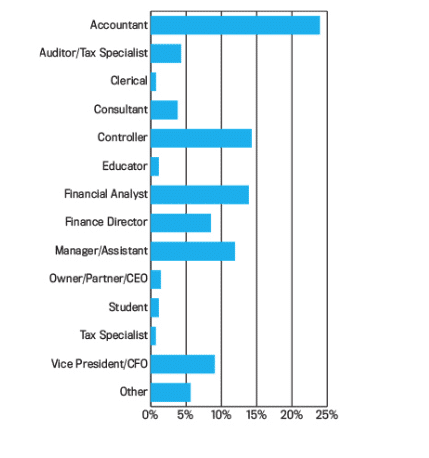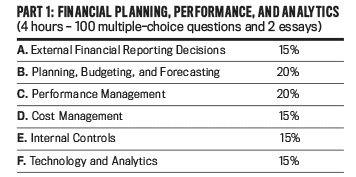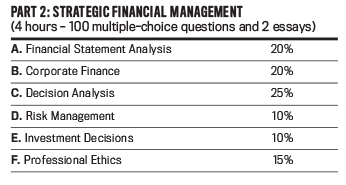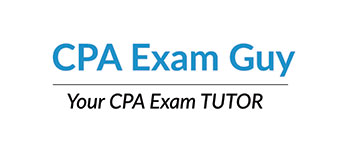There’s a significant development that CMA candidates should be aware of. The Institute of Certified Management Accountants (ICMA) has implemented some changes to the Certified Management Accountant exam.
These changes have already come into effect from the beginning of 2024 and will have an impact on both Part 1 and Part 2 of the CMA exam. Part 1 has seen fairly extensive changes, while Part 2 has been altered to a lesser degree.
Keep reading to find out:
- Why the CMA exam has been changed
- What’s been added and what’s been removed from the course content
- How these changes affect candidates and the steps that they should take
Why has the CMA exam been changed?
Every few years, the ICMA conducts a job analysis survey. They prepare a questionnaire that is sent to members of the Institute of Management Accountants. Additionally, the questionnaire is sent to other professionals in companies of different sizes across the world.
The list of survey respondents includes accountants, managers, CFOs, CEOs, and tax specialists. Here are the job titles of the respondents to the ICMA job analysis survey that was carried out in 2018.
Examples of respondents’ job titles

The job analysis survey’s purpose was to determine if the CMA exam continues to include the topics that are of the greatest importance to management accounting and finance professionals. Over 2,000 respondents provided their inputs to the ICMA in 2018.
The results of this survey were used to make changes to the course content for the CMA exam.
What did survey respondents say to the ICMA?
The consensus was that rapid developments in technology have led to changes in the management accounting profession. Artificial intelligence and robotic process automation are just two examples of these changes. Ultimately, these technological changes are leading to a shift in the way management accountants carry out their jobs.
Hence, the ICMA has implemented several changes in the CMA exam based on the information and feedback that it received. Let’s find out what these changes are.
Rapid developments in technology have led to changes in the management accounting profession. Artificial intelligence and robotic process automation are just two examples of these changes. Ultimately, these technological changes are leading to a shift in the way management accountants carry out their jobs.
Compare The Best CMA Review Courses
CMA Exam Updates – What’s been added and what’s been removed?
Although the CMA has undergone some exam changes, the basic structure remains the same. Both Part 1 and Part 2 of the exam will continue to be four-hour tests. Each will have 100 multiple-choice questions and two essay questions.

However, now there will be an added focus on technology. The new Part 1 exam, which has come into effect in January 2020, includes a section called Technology and Analytics that comprises 15% of the Part 1 exam content.
Here are some specific topics that will be covered in this new exam section:
- Information systems
- Data governance
- Technology-enabled finance transformation
- Data analytics
Here’s the key takeaway: this new Technology and Analytics section forms 15% of the exam content. Consequently, the focus on two sections has been reduced to accommodate this change. Planning, Budgeting, and Forecasting now stands at 20%, down from its earlier level of 30%. Cost Management has also seen its share fall to 15% from 20%.
Here’s an illustration that provides details of the revised content for Part 1 of the CMA exam.

CMA Exam Changes to Part 2
The content for Part 2 of the CMA certification exam has been changed as well. The new version has an increased focus on Professional Ethics and Decision Analysis. These are existing sections in Part 2, but their content coverage percentage has been revised upwards.
Here is how the content in Part 2 of the CMA exam has changed:
- Professional Ethics: Up from 10% to 15%
- Decision Analysis: Up from 20% to 25%
- Financial Statement Analysis: Down from 25% to 20%
- Investment Decisions: Down from 15% to 10%
And here’s the final standings for revised content on Part 2 of the CMA exam:

Miscellaneous CMA Exam Updates
Let’s dig a little deeper into the changes to the CMA exam in 2020. One of the additions to the course content in Part 1 is the introduction of a new topic called Integrated Reporting. Additionally, the subsection on Internal Auditing has been deleted.
There are crucial changes in Part 2 as well. Two new topics — Ethical Leadership and Sustainability and Social Reporting — have been introduced. Additionally, three topics (off-balance-sheet financing, tax implications of transfer pricing, and real options) have been dropped.
Here’s a PDF link from the IMA that provides the complete content specification outlines for the Certified Management Accountant examinations.
How do these changes affect CMA candidates?
The new course content has come into effect from January 2020, which means that the last testing window for the old content was September/October 2019. Let’s see how this affects current CMA candidates.
Consider a candidate who has passed Part 1 of the CMA exam in 2019 and plans to take Part 2 in 2020. Here’s how the changes to the course content will impact her:
- The Part 2 exam that she takes will be based on the new course content.
- However, she will get credit for the Part 1 exam that she has passed even though the study materials she used contained the old course content. To clarify this point, it won’t be necessary for her to retake Part 1.
You should also know that the new study material for the updated CMA exams is available. This can be obtained from the Review Course Providers listed on the Institute of Management Accountants’ website.
Dennis Whitney, Senior Vice President at the Institute of Management Accountants, points out that “All the review course providers who publish books have the new content specification outlines and the learning outcome statements and have been working for a number of months on preparing the new material.” This means you’ll be able to learn updated materials from all the top-rated CMA prep courses right now!
Bottom Line: The ICMA has introduced changes to the exam in 2020 to ensure that the CMA program remains relevant to modern businesses and finance industries. Hence, candidates should remember to pay special attention to the newly introduced course content when they are preparing for the exam.
Ultimately, doing this will increase your chances of passing. It will also prepare you for your career and give you the knowledge you need to carry out your job more effectively and efficiently.
Compare The Best CMA Review Courses
Bryce Welker is a regular public speaker and contributor to several online publications, including Forbes, Inc.com, and Entreprenuer.com. Bryce is the mastermind behind over twenty different websites devoted to providing people like you with the resources necessary to successfully pass certification examinations.
